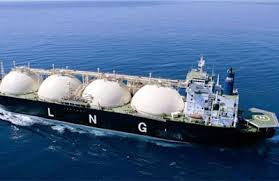Chuks Isiwu 17 August 2016, Sweetcrude, Lagos – Liquefied Natural Gas, LNG, supply from Nigeria has dropped occasioned by the recent disruption in gas flow to the Nigerian Liquefied Natural Gas, NLNG, plant on Bonny Island, Rivers State.

Shell Nigeria declared force majeure on gas supplies to the NLNG from the Eastern Gas Gathering System, EGGS, on August 4, following a leak along the EGGS-1.
It declared another force majeure on gas supply to the NLNG plant on August 8, also citing a leak on the Eastern Gas Gathering System pipeline through which it supplies the bulk of its gas to NLNG.
Industry observers were of the expectation that these development would likely push up prices, but, it has indeed, not impacted the global market, where prices have rather dropped over the last two weeks.
Traders said that despite the shortfall in supplies from Nigeria, added output from the Pacific producers has helped fill the gap in the market.
Prices for September spot delivery fell, last week, to around $5.60 per million British thermal units, mmBtu, 20 cents below the previous week’s levels, with October trading five to 10 cents below September, sources said.
Two of four cargoes recently sold by Russia’s Sakhalin II plant fetched a price in the $5 per mmBtu range – reflecting end-user demand, one trader source said, citing it as above-market.
The decline in LNG prices spells double trouble for Nigeria, which sells part of its LNG on the spot market, and which is already suffering the negative effect of crude oil price decline.
According to experts, a reduction in LNG exports is also a blow to Nigeria because its oil output is already being constrained by militant attacks, which has considerably slashed output from 2.2 million barrels her day.
SweetcrudeReports could not immediately ascertained how much volume of the NLNG’s overall output has been affected by the Shell Nigeria force majeure but sources said it was substantial.
The NLNG plant has a capacity to process 22 million metric tons a year of LNG – about 7 percent of world supply – and 5 million tons of natural gas liquids. Besides selling on the spot market, NLNG has long-term supply contracts with Italy’s Enel, France’s Engie SA and Portugal’s Galp, among others.
NLNG, which began gas export about 16 years ago, is owned by the Nigerian National Petroleum Corporation, NNPC, which holds 49 percent share of the business, Shell with 25.6 percent share, Total LNG Nigeria Limited (15 per cent and Eni International (10.4 per cent).
Global spot LNG prices were down more than two-thirds from 2014 levels, but rose in recent months due to production outages in Angola and Australia.
The rally ran out of steam recently and prices declined sharply as Chevron’s Gorgon LNG project resumed production.



